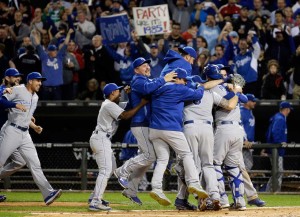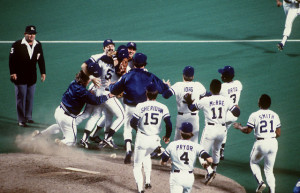Baseball Playoffs Have Feel of the 1980s

With their first playoff appearance in 29 years, the Kansas City Royals are partying like it is 1985.
If you followed baseball in the late 1970s and early 1980s and then haven’t paid attention for the last 30 years, the teams appearing in the 2014 baseball post season probably don’t seem that strange to you.
Included amongst the squads that will be battling for the World Series Trophy are the World Series Champions from 1979 (Pittsburgh Pirates), 1981 & 1988 (Los Angeles Dodgers), 1982 (St. Louis Cardinals), 1983 (Baltimore Orioles), 1984 (Detroit Tigers), 1985 (Kansas City Royals) and 1989 (Oakland A’s).
Of course, what those of us who have been following baseball for the last 30 years know, is that of these teams only the Cardinals have won another World Series since the 1980s (2006 and 2011) with the 2006 victory coming over the Tigers, who also appeared in the World Series in 2012.
With the exception of the Dodgers, who have made the playoffs seven times since winning the 1988 World Series, and the A’s, who have made eight playoff appearances since losing the 1990 World Series, the other teams in that group have seen some pretty lean times since the 1980s.
No team has waited longer to get back to the post season than the Kansas City Royals.
After making the playoffs seven times and finishing no worse than second during a 10-year stretch from 1976-1985 that culminated with their World Series Championship, the Royals went into a nearly three decade tailspin.
After winning the World Series, the Royals were still generally competitive for the next decade as they had a winning record six times and finished second in their division three times between 1986 and 1995.
However, their second place finish in 1995 came despite a losing record and from that season through 2012 the Royals had only one winning season and five times had a season winning percentage below .400. Despite going from a seven team division to a five team division with realignment in 1995, Kansas City finished as high as third place only three times in 17 seasons.

The 1985 World Series title for the Royals marked the culmination of a decade in which they made the playoffs seven times.
[poll id=”271″]
Both the Pittsburgh Pirates and Baltimore Orioles, are making their second playoff appearance in recent years after long droughts.
The Pirates returned to postseason play for the first time in 21 years in 2013 and this season are making their second straight playoff appearance, which is amazing considering that between 1993 through 2012 they didn’t have a single winning record. It was especially bleak from 2000-2012 as the Pirates never finished higher than fourth in their six team division.
After winning their last World Series title in 1983 and then posting winning records the next two seasons to run their streak of consecutive winning seasons to 18 the Orioles fell apart over the final two months of the 1986 season and it just got worse over the next two years.
By 1988, the Orioles began the season with a record 21 consecutive losses and ultimately won only 54 games. Surprisingly, they actually registered a winning record and nearly made the playoffs the following year to trigger a nine year stretch during which the Orioles had six winning seasons and made back-to-back appearances in the ALCS in 1996 and 1997.
However, they couldn’t get over the top and beginning in 1998 would fall into a spiral similar to that of the Royals and Pirates. Baltimore did not record another winning season until reversing their record from 69-93 in 2011 to 93-69 in 2012 to advance to the American League Division Series.
Though the Detroit Tigers reached the World Series in 2006 and are making their fourth straight playoff appearance this season, they also had some very low times after winning the 1984 World Series.
They reached the ALCS in 1987, but after winning 85 games in 1993, wouldn’t have a winning record again until 2006. During that stretch they had a 109 loss season in 1996 and then in 2003 nearly set a new major league record for futility with a 43-119 record.
Outgoing baseball commissioner Bud Selig will point to the fact that small or mid-market teams like the Royals, Pirates, A’s and Orioles are back in the playoff mix as a signal that baseball’s competitive balance is alive and well.
However, since the 1994 strike cost baseball the World Series, winning the Fall Classic has been anything but inclusive.
Only nine franchises have won a World Series in the 19 seasons since the strike. Of those nine, none are from what would be considered a “small market” and only the 2002 Anaheim Angels and 2003 Florida Marlins were not ranked in the top half in payroll (with most ranking in the top 10).
In contrast, in the 19 seasons prior to the strike, 13 different teams won at least one World Series title. Included in that group was the Kansas City Royals, Pittsburgh Pirates, Oakland A’s and Minnesota Twins.
One of the big things that happened as a result of the inability of baseball to negotiate some type of salary cap in the 1995 agreement was that the gap between the “have’s” and “have not’s” has grown from a minor hole to a gigantic canyon.
When the Kansas City Royals won their World Series in 1985, their team payroll of $10,565,346 was the 13th highest in the league, but was only $4.3 million less than the highest payroll in the league ($14,807,000 by the Atlanta Braves).

Nothing did more to kill competitive balance in baseball than the 1994 strike, in which Donald Fehr for the Player’s Association and Bud Selig representing the owners were unable to make a deal that helped the overall competitiveness.
In contrast, the 2013 Kansas City payroll of $87,426,250 ranked 16th in the league, but was roughly $167 million below the $254,161,000 payroll of the Los Angeles Dodgers. The World Series Champion Boston Red Sox ranked third in payroll at $177,930,500.
In addition to reducing the number of teams winning the World Series, the last two decades has also seen a dramatic increase in long periods of struggle for franchises that are often at the lower or middle end of the payroll structure.
Between 1950 and 1994, only four teams (1953-1962 Chicago Cubs, 1953-1967 Kansas City Athletics, 1969-78 Montreal Expos and the 1977-1990 Seattle Mariners) registered periods of 10 or more consecutive losing seasons and two of those four were expansion teams.
Since 1994, five franchises (1993-2012 Pittsburgh Pirates, 1993-2004 Milwaukee Brewers, 1994-2005 Detroit Tigers, 1998-2007 Tampa Bay Rays and the 1998-2011 Baltimore Orioles) have registered stretches of 10 or more consecutive seasons with a losing record and only the Rays were an expansion team.
In addition, the Kansas City Royals had a losing record in 17 of 18 seasons between 1995 and 2012 (winning mark in 2004 interrupted their streak), the Cincinnati Reds had a streak of nine consecutive losing seasons from 2001-2009 and the Colorado Rockies have had only four winning seasons since 1997.
After registering losing records this season, four franchises now have posted a losing record for at least the last five seasons. The Houston Astros and New York Mets have active streaks of six seasons and the Miami Marlins and Chicago Cubs now have streaks of five consecutive losing seasons.
Conversely, since the 1994 strike, the New York Yankees have not had a season with a losing record and while the Boston Red Sox have four losing seasons during that stretch, they have not posted a below .500 record in consecutive campaigns.
Of the franchises in the 2014 playoffs, the one perhaps most impacted by the 1994 strike is the Washington Nationals.
Known at the time as the Montreal Expos, they had the best record in baseball when the strike hit, but after struggling with a back-lash from disheartened fans, the Expos saw a continued decline in their fan base over the next decade and ultimately left for Washington in 2005.
The Nationals had six straight losing seasons between 2006 and 2011, but are now completing their third straight winning season and will be making their second playoff appearance in the last three years.
It is great to see so many long-struggling teams back in the playoffs, but unfortunately in the current structure of baseball sustaining success seems to be affordable for only a few franchises.





I have learn several excellent stuff here. Certainly price bookmarking
for revisiting. I wonder how much effort you set to create this sort of fantastic informative web site.
I was suggested this website by my cousin. I aam not sure whether this post
is written by him as nobody else know such dettailed about my trouble.
You are incredible! Thanks!
you are truly a good webmaster. The website loading pace is incredible.
It kind of feels that you’re doing any distinctive trick.
Furthermore, The contents are masterwork. you’ve done a fantastic
task on this matter!
Appreciate this post. Will trry it out.
There are three basic forms of software, although
these will have their own subsections, as will probably be discussed
later:. Schoolwork is often required to be written on computer
today, and again, that is only really possible if
some sort of text software program is available.
A number of musicians have been struggling to sustain themselves
thereby they have opted to doing other ventures of the side.
Rachael Ray is the most highly regarded kitchen and cooking expert in today’s times.
While users scramble for choices to Megaupload or Megavideo, a
transformation takes place. Naturally, the complete versions of the software are preferred, nevertheless the simplified versions are also to be found,
depending on what is available.
Real Real estate Pakenham Victoria offers a variety of plenty in addition to properties available. Encounter pleasurable at its finest. Observe all your family dwell in relaxation and well-being. Obtain your own home now on Pakenham Inclines.mode real estate
Real real estate investing is accepted as as one of the most reliable and successful investment software. Whether people opt to invest in commercial houses, properties or maybe in housing buildings you then have a wide probability to get returning your profits and gain capital gets.costa real estate
Real real estate as we all believe is amongst the fastest rising businesses on the world. A new study has revealed that many people across the world are getting keen on buying property or home in incredible holiday areas.pacific city real estate
Choosing the right legal representation is the first step towards achieving a successful outcome. Nothing is more frustrating to a client than lack of communication. Mr. Bishop is truly dedicated to personally communicating regularly, responding quickly and offering hands-on feedback in reference to: Divorce process – See more at: san diego divorce attorney
nice post……..
This is a very nice blog site. Its always post great news. I read your post its very helpful.